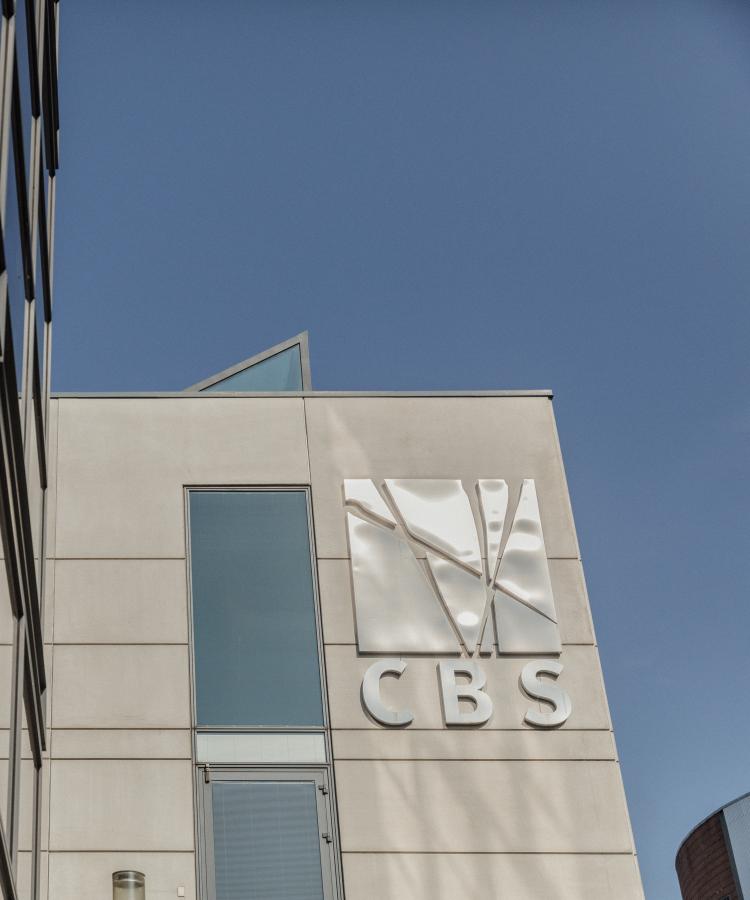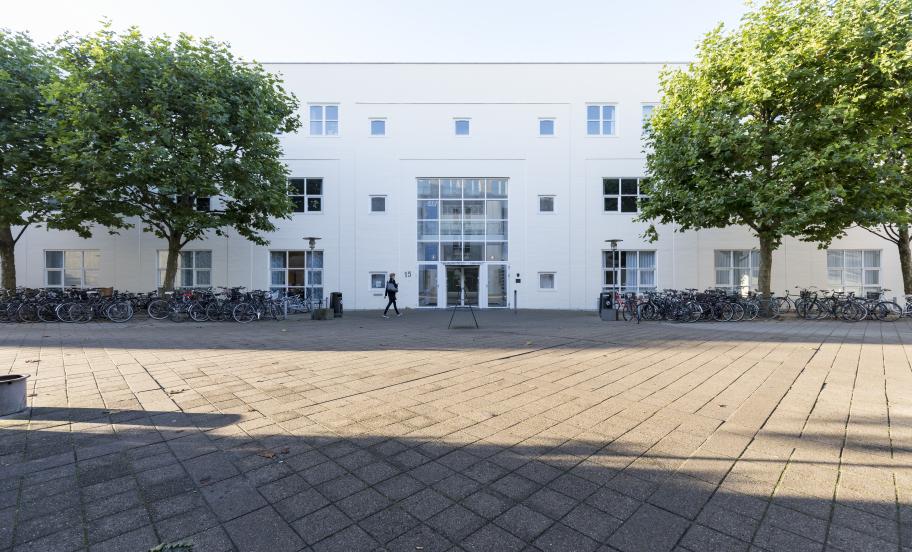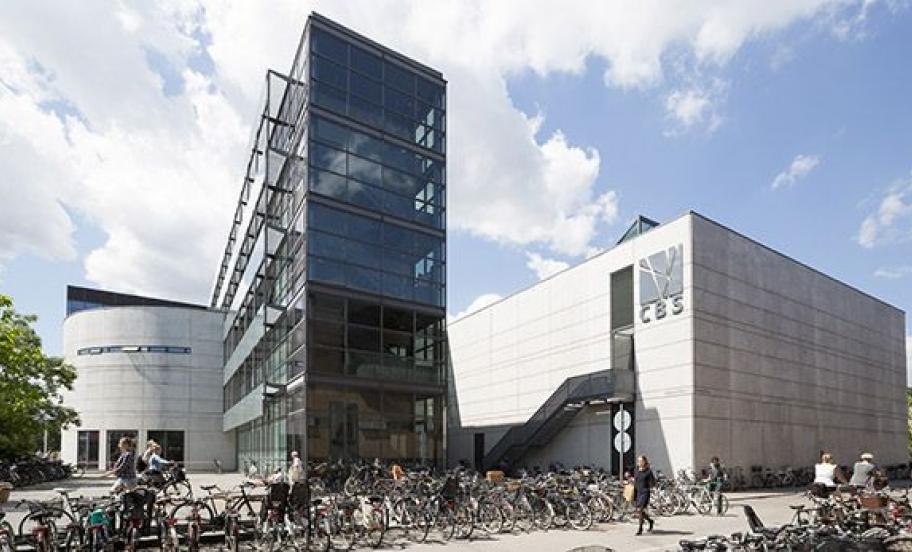MSc in International Business and Politics
In the MSc IBP programme, you will explore how companies and governments influence each other. You will build solid business skills, work with real-world issues and gain the tools to understand global challenges from both an economic and political perspective.

Om MSc in International Business and Politics
Why study MSc IBP?
To like and do well in the programme MSc IBP you should be interested in:
Interdisciplinary perspective with real-world relevance
Tackle current global challenges
Career opportunities with an international outlook
“ The intensity of the academic level and workload has increased. We are covering more ground in less time. ” Mikkel
Student, MSc IBP

You much choose your focus
The MSc IBP builds fundamental business skills by considering business activities within a broader political and economic context.
The programme rests upon the development of specific skills in the four academic streams around which it is structured: business strategies, international political economy, economics and policy-making processes.
“ Being someone that enjoys academic challenges and a bit of a competitive environment, I still feel like the level is manageable. ” Joanna
Student, MSc IBP

Understand the intersection of business and politics
Business Economics
The core course considers international trade theory, foreign direct investment (FDI), and the operations of financial markets. The optional stream courses build upon BSc-level economics and offer a microeconomic study of firms and markets as well as advanced macroeconomics
Business Strategies
The core course surveys the contemporary strategic challenges facing multinational enterprises whilst the optional stream courses use theoretical frameworks to examine issues related to people management as well as looking at innovation processes and the ways in which firms access, transfer and use globally dispersed knowledge.
International Business Regulation
The courses build upon the study of international political economy from the undergraduate level by considering theoretical perspectives at an advanced level and applying them to empirical case studies. The optional stream courses policies focus on the distribution problems in the governance of the green transition, and forms of global risk management for new and old problems in the world economy.
Business and Public Policy
The core course considers the making of public policy. The instruments that can be used to regulate different types of policy and introduces ways of analysing policy processes as to devise recommendations for businesses and governments.
It incorporates policymaking simulations, negotiation exercises and opportunities to explore ‘real world’ situations. The optional stream courses consider corruption in both developed and developing countries and the policy challenges that it poses as well as evidence-based policymaking.
In the courses you will
-
Analyse the decisions made by firms, the factors shaping those decisions, the market and non-market strategies they employ and the contemporary strategic challenges that they face.
-
consider the interactions between firms and governments, the prime forces that shape the character of the national and international economy.
-
analyse the decisions made by firms, the factors shaping those decisions, the different ideas, interests, and institutions that influence the making and implementation of public policy, the impact of the institutions and structures that mediate between markets and states, and the character of subsequent policy outcomes .
-
address issues at regional, national and global levels. It therefore considers contemporary developments and processes in and across emerging markets and advanced economies as well as the role played by supra-national institutions such as the World Bank and the European Union.
-
assess the ways in which states and businesses respond to contemporary challenges such as sustainability, inequality, the increasing volatility of governance structures and market uncertainties.
Open day for master programmes 2026
Are you considering a master programme at CBS? Come visit us for Open Day and hear about your opportunities .
Read more
Master events
See upcoming events that can help you with your study choice and admission.
Opbygning
Politik
You learn how political institutions, power structures, and governance systems shape business and economic outcomes. Politics in MSc IBP focuses on understanding global governance, public policy, and international political economy — and how political decisions impact corporate strategy and market dynamics.
Økonomi og matematik
You learn to use economic theory, data, and quantitative methods to understand how markets operate and how policies affect business and society. Economics and mathematics in MSc IBP focus on applying analytical tools to evaluate trade, growth, and regulation in global markets.
3 things to consider
3 good reasons to choose MSc IBP
Are you ready for an analytical approach to politics?
Do you have a solid foundation in either business or politics?
Are you engaged with global affairs?
Choose a specialisation
The 1st semester consists of four mandatory core courses addressing each of the four themes that define the programme. The 2nd semester consists of two mandatory courses that brings together the different themes and applies them to specific business cases. This is then followed by more specialist stream courses where you choose between 4 streams that each consist of 2 courses.
The 4 stream courses are:
- Business Economics
- Business Strategies
- International Business Regulation
- Business and Public Policy
Programme overview
Choose a specialisation below to see the programme overview:
Business Economics (Panel content)
1. semester
2. semester
3. semester
4. semester
Business Strategies (Panel content)
1. semester
2. semester
3. semester
4. semester
International Business Regulation (Panel content)
1. semester
2. semester
3. semester
4. semester
Business and Public Policy (Panel content)
1. semester
2. semester
3. semester
4. semester
More about the programme progression
From bachelor programme to MSc in International Business and Politics
The programme builds on the BSc in International Business and Politics. This gives a strong foundation in both business studies, political science and international political economy.
Not all students in the MSc IBP have similar levels of skills in business or politics. Some may be less prepared for either the business or the political aspects of the programme.
For instance, because the programme also enrolls many students with other bachelor level backgrounds. If your bachelor degree has provided you with a limited foundation in one of the two aspects, it is a good idea to try to make up for this before you enter the MSc IBP.
Options during the programme
Electives
On the 3rd semester, you can choose to study courses of your specific interest. CBS offers a large number of electives within a wide range of topics. You can also choose to take electives at other Danish universities. The electives you choose have to be relevant for your programme.
See the current selection of CBS electives on Courses at master level.
Minor
On the 3rd semester, you can also choose to study a so-called minor. A minor is a package of electives within a specific academic area. Typically, it consists of 3 courses. By taking a minor, you strengthen your competences within a specific area of interest, and you can use it to qualify for specific jobs or industries.
See the current selection of CBS minors on Minors.
Exchange
Many students choose to go on exchange on their 3rd semester; usually at one of CBS’ more than 300 partner universities. When you go on exchange through CBS, you do not have to pay for the teaching at the foreign university (with a few exceptions), and you can bring your SU (student grant).
Find a list of all CBS partner universities here.
Internship
You can choose to replace some of your electives with a so-called academic internship. The academic internship consists of an internship period at a company, which is then completed with a project report. You can do the internship at a company in Denmark or abroad.
When doing an internship you get the opportunity to relate theory to practice and reflect on the academic training you receive at CBS in a practical setting. Therefore, the project report and work assignments during your internship have to be relevant to your study programme.
CEMS
On MSc IBP, you can apply for the CEMS - Master in International Management programme. CEMS MIM is a double degree programme, which gives you the opportunity to add a second degree in international management to your CBS degree. This means that you will get both the MSc degree and the CEMS in International Management degree.
CEMS is a 1-year programme, which you study in combination with your CBS degree in your 3rd and 4th semester. Part of it takes place at one of the other CEMS universities abroad.
Learn more about CEMS / Master in International Management.
Master's thesis
Your 2nd year is completed with a master's thesis. You choose the topic you want to write about which allows you to focus on a specific topic of your interest. Typically, you write your master's thesis with a fellow student.
“ IBP presents an environment where people are collaborative and help each other out. One of the IBP slogans is "sharing is caring", and we really live by that. ” Jonna
Student, Msc IBP

Open day for master programmes 2026
Are you considering a master programme at CBS? Come visit us for Open Day and hear about your opportunities .
Read more
Studiemiljø
International environment
The study environment is very international with both students and faculty having diverse national backgrounds. Around 40% of the students have a non-Danish background.
The IBP Union
The IBP Union is a student organisation for students in both BSc IBP and MSc IBP. The union arranges guest lectures, case competitions, exchange with students from other universities, dialogue meetings with alumni, and social events.
Find out more on ibpunion.dk
Student life at CBS
Studying at CBS is much more than just preparing for and going to classes.
At CBS, there are more than 20,000 students with different backgrounds and nationalities. Teamwork is an essential part of studying at CBS both in classes and in extracurricular activities.
With more than 100 student organisations, you also have plenty of opportunities to engage and connect with students across programmes and classes.
Learn more about the vibrant student life at CBS, the student organisations, and the international environment on Student life.
Mød de studerende
For internationals
Are you interested in studying at CBS as a full degree or exchange student? Or participating in CBS Summer University? Are you a freemover or do you want to study a single course? Here you can find information regarding how to apply, how to prepare for life in Denmark and what studying at CBS is like. Welcome!

Teaching and exams
Teaching
Most of the professors are non-Danish, and the teaching styles vary from course to course. There is generally a high level of student participation and interaction between students and professors. Exercises and tutorials are also part of the teaching. The high level of interaction helps students prepare for oral exams.
Read more about Teaching and working methods.
Exams
The exam forms in MSc IBP are a mix of the different exam types offered at CBS. The exam types vary from 4 hour sit-in exams, to written individual home assignments and group home assignments.
Read more about Exams.
Student life at CBS
Being a CBS student is about more than going to lectures and doing exams.
Get a glimpse of student life at CBS. Here, you can explore what a typical day of teaching and exams looks like.
Also, you can learn how our programmes are structured and read about social life on campus, including the many ways to connect with fellow students.

Time consumption
Workload
You should know that it is demanding to study in a graduate programme, and both the curriculum and workload is significantly higher than at bachelor level.
If you are studying on a full-time graduate programme, you should expect spending approximately 37 hours on average on your studies each week. The workload will vary during the year.
Hectic around exams
The time leading up to assignment submissions and exams can be hectic, and you can easily work more than 40 hours a week in this period. Preparing for oral exams can be especially time consuming, because you have to be able to explain and discuss the covered concepts and theories and learn things by heart.
Read more on Teaching and working methods
Student job
Most programmes are quite flexible in terms of combining studies with a student job. Most students work a maximum of 15 hours a week in order to have sufficient time for their studies.
Studying in Denmark - for internationals
If this is your first time studying in Denmark, you may find teaching and exam formats, the grading scale and the academic calendar very different from what you are used to.
Read about everything you need to know as an international student studying at CBS on International students
In need of special support?
Do you have a disability such as dyslexia, anxiety, autism, ADHD, long-term effects of concussion or another physical, psychological or neurological disability?
Then you have the opportunity to apply for Special Educational Support (SPS) and special conditions while studying.
This ensures you can study on equal terms with your fellow students.

Adgangskrav
Entry requirements
You are qualified for admission to the study programme if you fulfil the following requirements.
Please note that fulfilling the requirements does not guarantee you a study place.
1. Bachelor's degree
2. English language requirement
3. Academic Requirements
1. Bachelor degree
You must have a bachelor's degree to fulfil the general requirement for CBS' master programmes.
You must have completed your bachelor programme before study start.
Legal claim:
The MSc in International Business and Politics is the natural progression for students from the BSc in International Business and Politics from CBS and the BSc in Business Administration and Sociology from CBS. If you hold these bachelor degrees, you automatically fulfil all the entry requirements and you may also have legal claim guaranteeing admission. Read more about legal claim.
Students from other programmes or institutions can also qualify for MScIBP if they fulfil the entry requirements below in terms of academic content and the number of ECTS.
You have not yet completed your bachelor programme
You can still apply for admission even if you have not yet completed your bachelor programme. However, you must complete it before study start. If you are accepted into a master programme, you will be conditionally enrolled, which means:
- You must complete your bachelor programme before you can start at CBS
- You must upload your bachelor diploma and transcript no later than 31 August
2. Language requirement
English level A (Panel content)
The language requirement
The language requirement is English at Danish level A.
Documentation deadline
You must fulfil and document the language requirement before the application deadline.
Check if you fulfil the language requirement
Use the tabs above to find out how you can document English level A. Each tab shows an approved way to fulfil the requirement, depending on your background.
We do not accept any documents other than those listed in the tabs.
The following cannot be used as alternatives:
- a letter from your university
- a letter from a professor
- a combination of several incomplete qualifications from the lists above
- Bachelor degrees or courses regardless of origin and level
Danish upper secondary exam (Panel content)
Required courses and levels
Danish upper secondary exam
If you have passed English level A from an upper secondary school in Denmark (ie. stx, hhx, htx, hf) you fulfil this requirement.
English level A must be passed with a minimum grade point average of 2.0.
Supplementary upper secondary courses
English A as a single subject via secondary school supplementation (Gymnasialt suppleringskursus (GSK)) or as a Higher Preparation Examination single subject (HF-enkeltfag).
English level A must be passed with a minimum grade point average of 2.0.
Individual competency assessment (IKV)
If you think you have language competences corresponding to an English level A, you have the possibility to request an assessment - Individuel Kompetencevurdering (IKV) from a Danish VUC (adult education centre).
Required documentation
Upper secondary (ie. stx, hhx, htx, hf) certificate:
- a scan/photo of the original, stamped and signed hard copy or
- a digitally signed certificate downloaded from Min Kompetencemappe
Individual competency assessment (IKV):
- Official IKV assessment
Other upper secondary exams (Panel content)
Find your country
Austria
Required courses and levels
Minimum total sum of 11 weekly lessons over years 10, 11 and 12 and Erste lebende Fremdsprache and Wahlpflichtgegenstände in English language. Subjects that are taught in English even as Wahlpflichtgegenstände do not count.
Required documentation
Reifeprüfung diploma certificate including Stundentafel covering (min.) 4 years of the Oberstufe OR
Reife- und Diplomprüfung diploma certificate including Stundentafel covering (min.) 5 years of the Oberstufe.
International Baccalaureate (IB)
Required courses and levels
- English A1, higher level
- English A2, higher level
- English B, higher level
- English A1, standard level
- English A2, standard level
- English A Language and Literature, higher level
- English A Language and Literature, standard level
- English A Literature, higher level
- English A Literature, standard level
Required documentation
Official IB diploma and/or transcript. Alternatively, you can give CBS access to your results via IBO.org.
European Baccalaureate (EB)
Required courses and levels
• L I
• L II
• L III – 6 years (documentation for 6 years must be included)
Required documentation
Official EB diploma and/or transcript
Australia
Required courses and levels
A complete upper secondary education from Australia, where the majority of the education has been taught in English, fulfils the English A language requirement.
Required documentation
Senior Secondary Certificate of Education (SSCE) as well as Statement of Result or Record of Achievement or Qualifications Certificate, covering subjects and grades during the last two years of the secondary education.
Bulgaria
Required courses and levels
English as first foreign language (556 number of classes) AND English Intense Study (648 number of classes)
Required documentation
- Diploma za (Zavarsheno) Sredno Obrazovanie / za Sredno Obrazovanie and
- Grade transcript for Years 10, 11 and 12
Canada
Required courses and levels
A complete upper secondary education from Canada, where the majority of the education has been taught in English, fulfils the English A language requirement.
Required documentation
High School Diploma / Graduation Diploma (or equivalent for your province) as well as Transcript of grades / High School Results (or equivalent for your province)
England, Wales, Northern Ireland
Required courses and levels
- A complete upper secondary education taught in England, Wales or Northern Ireland or
- A level English Language or
- A level English Literature
Required documentation
- GCSE certificate(s) (with a min. of 6 subjects) as well as A-level (Advanced level) certificate(s) (with a min. of 3 subjects) both taken in the UK or
- Official A level certificate for either English Language or English Literature
Germany
Required qualifications
English passed (5 points or higher) as a higher level course (either erhöhtes Anforderungsniveau or Leistungskurs) in both the Qualifikationsphase (half-year results) and the Abiturprüfung (Prüfungsfach) as part of the Abitur.
Courses marked erhöhtes Anforderungsniveau or Leistungskurs may be designated in a number of different ways such as:
- L or LK or Leistungskurs
- P or Profilfach
- K or Kernfach*
- eA or erhöhtes Anforderungsniveau
- E and designated as erhöhtes Anforderungsniveau in the certificate legend
- HF or Hauptfach
- PF or Profilfach
- Highlighted in grey and and designated as Leistungsfächer in the certificate legend
*If you have had English as a Kernfach your Abiturzeugnis needs to state that this means you have had English at either erhöhtes Anforderungsniveau or as Leistungskurs.
For applicants with a Waldorfschule/Rudolf Steiner Schule Abitur or Deutsche Internationale Abitur/prüfung (DIA/DIAP) please contact graduateadmission@cbs.dk for more information.
Required documentation
All pages of your Zeugnis der Allgemeinen Hochschulreife (Abiturzeugnis): cover, diploma and report card for all 4 half-years showing the Qualifikationsphase as well as the Abiturprüfung
Iceland
Required qualifications
For upper secondary studies completed according to the 2008 reform:
Minimum 25 Fein (new credits) obtained in English; of these, minimum 15 Fein must be at Þrep (qualification level) 3 or higher
For upper secondary studies completed according to the 1999 reform:
- Minimum 18 einingar (old credits) obtained in English; minimum one English subject must be at level 6 or higher (e.g. ENS 603)
Required documentation
Official transcript (in Icelandic) for Stúdentspróf
NB: Letters issued by the institution that do not list the names, module codes, grades and codes/points for all the passed courses are not accepted.
Ireland
Required qualifications
A complete upper secondary education from Ireland, where the majority of the education has been taught in English, fulfils the English A language requirement.
Required documentation
The Established Leaving Certificate Examination (Leaving Cert) with a min. of 6 subjects total
Malta
Required qualifications
A level
Required documentation
Matriculation Certificate and Advanced Level Certificate og Intermediate Level Certificate
New Zealand
Required qualifications
A complete upper secondary education from New Zealand, where the majority of the education has been taught in English, fulfils the English A language requirement.
Required documentation
National Certificate of Education Achievement (NCEA) levels 1 and 2 and 3
Norway
Required qualifications
The following combinations from the Norwegian upper secondary education courses must be passed:
VG3 SPR3010 & SPR3011
or
VG3 SPR3012 & SPR3013
or
VG SPR3031 & SPR3032
Required documentation
Official transcript for the Vitnemål for videregående opplæring
Scotland
Required qualifications
A complete upper secondary education from Scotland, where the majority of the education has been taught in English, fulfils the English A language requirement.
Required documentation
Scottish Qualification Certificate as well as Summary of Attainment, Detail Record of Attainment and Profiles
Singapore
Required qualifications
A complete upper secondary education from Singapore, where the majority of the education has been taught in English, fulfils the English A language requirement.
Required documentation
Singapore-Cambridge GCE A-level exam certificate with a min. of 4 (H1, H2 and H3) exams total, as well as General Paper and Project Work
South Africa
Required qualifications
A complete upper secondary education from South Africa, where the majority of the education has been taught in English, fulfils the English A language requirement.
Required documentation
National Senior Certificate (Matric/Matriculation Certificate) as well as grade transcript covering subjects and grades during all three years of studies
United States
Required qualifications
A complete upper secondary education from the United States, where the majority of the education has been taught in English, fulfils the English A language requirement.
Required documentation
High School Diploma as well as High School Grade transcript (covering all four years’ worth of subjects and grades) taken in the US.
The following upper secondary qualifications do not fulfil English level A
The highest upper secondary level of English from the following countries does not fulfil English level A. If your upper secondary education is from one of the countries listed below, you will need to take a language test:
- Belgium
- Croatia
- Cyprus
- Czechia
- Estonia
- Finland
- France
- Greece
- Hungary
- Italy
- Latvia
- Liechtenstein
- Lithuania
- Luxembourg
- The Netherlands
- Poland
- Portugal
- Romania
- Slovakia
- Slovenia
- Spain
- Sweden
- Switzerland
- All non-EU countries other than Australia, Canada, New Zealand, UK, Singapore, South Africa and the US
Language tests (Panel content)
Language tests
TOEFL
TOEFL iBT/iBT Home Edition
The TOEFL iBT/ iBT Home Edition taken on or after 21 January 2026 must be passed with both
- a minimum overall score of at least 5 and
- a minimum score of 4,5 in each of the four different sections
Exceptionally, we accept an overall score of 94 (old scale) and 4,5 (new scale) in 2026. Both of these results must be present on the certificate. The subscores must still be a minimum of 4,5 in each of the four sections.
The TOEFL iBT/ iBT Home Edition taken before 21 January 2026 must be passed with both
- a minimum overall score of at least 94 and
- a minimum score of 20 in each of the four different sections
MyBest scores are not accepted.
Read more about the TOEFL and how to register on ETS.org
Documentation
Your TOEFL scores will be verified in the TOEFL database. You must list Copenhagen Business School as one of your score recipients when you sign up for the TOEFL test, or order a score sheet for Copenhagen Business School if you have already taken the test.
The TOEFL institution code for CBS is 7035.
You must upload either your digital copy, or a scan of your hard copy, TOEFL score sheet to the Application Portal.
Have you already passed a test?
Remember to check that your test date is no older than two years by the application deadline.
Be aware that it is your test date and not the date your test results were issued. If your test date is more than two years old by the application deadline, your test will not be accepted.
IELTS
IELTS Academic test
An IELTS academic test result of at least 7.0 with minimum 6.0 in each discipline is required.
IELTS tests that are more than two years old by the application deadline are not accepted
IELTS Online is accepted.
IELTS One Skill Retake scores are not accepted.
Read more about IELTS and how to register
Required documentation
Your IELTS results will be verified in the IELTS database. Please instruct your test centre to make your results available to Copenhagen Business School, either when you book your IELTS test or after the test date.
You must also upload a scan of your IELTS test report form to the Application Portal. If you have not received the physical test report form, you can upload a document with the "Test Report Form Number" (TRF Number) so we can verify your scores.
Have you already passed a test?
Remember to check that your test date is no older than two years by the application deadline.
Be aware that it is your test date and not the date your test results were issued. If your test date is more than two years old by the application deadline, your test will not be accepted.
Cambridge
The following Cambridge exams/certificates fulfil the English A language requirement.
- Cambridge C2 Proficiency (Certificate of Proficiency in English) passed with minimum C and an overall score of minimum 200.
Read more about the CPE and how to register.
- Cambridge C1 Advanced (Certificate of Advanced English) passed with minimum C and an overall score of minimum 185.
Read more about the CAE and how to register.
Documentation
In order for us to verify your results, you need to do the following:
- Sign up and share your results with Copenhagen Business School via the Candidate Results Website. Your Cambridge results are only valid if we can check them on their website.
- Upload your Cambridge C2 Proficiency (CPE) or Cambridge C1 Advanced (CAE) Statement of Results and/or Certificate in the application portal
The Certificate of Proficiency in English and Certificate of Advanced English have no expiration date and are valid for life.
CBS bachelor degree (Panel content)
English-taught bachelor degree from CBS
Applicants with an English-taught bachelor degree from CBS who continue their studies in English at master level have already had their qualifications checked and do not need to upload additional documents.
Danish-taught bachelor degree from CBS
If you have a Danish-taught bachelor degree from CBS, you must document that you fulfil English A. We did not check your English A qualifications when you applied for your bachelor degree, as it was not a requirement for a Danish-taught programme.
3. Academic requirements
You must fulfil the academic entry requirements for the programme before study start. The academic entry requirements is a total of 60 ECTS within the following areas:
15 ECTS in Economics including
- min. 5 ECTS in Microeconomics as well as
- min. 5 ECTS in Macroeconomics
15 ECTS in Business Administration
Examples include:
- Strategy
- Organisation
- Management
- Marketing
- Accounting
- Finance
- And the like
NB! Does not include: Micro-, Macro- or other fields of Economics, Public Administration, Quantitative Methods, Statistics, and the like
15 ECTS in Social Science Methodology
Examples include:
- Qualitative methods
- Quantitative methods
- Philosophy of science
- Research design
- Applied methods
- And the like
15 ECTS in Politics
Examples include:
- Political science
- Political theory
- International politics
- International political economy
- International relations
- And the like
Check if you fulfil the academic requirements
Advance assessment (Panel content)
Check the advance assessments
CBS Admissions cannot make a pre-assessment of your individual qualifications before you apply for admission.
Find your bachelor programme
Instead, we have assessed a number of bachelor programmes. In these so-called advance assessments, you can see whether your bachelor degree fulfils the academic entry requirements.
An advance assessment shows whether the obligatory courses in your bachelor programme fulfil the academic requirements for a master programme at CBS.
We typically prepare an advance assessment when many applicants from the same bachelor programme apply for the same master programme.
You can find them by clicking on the tabs above.
Missing courses?
If you are missing courses, you may be able to fulfil the requirements through relevant elective courses or supplementary courses.
See what to do if you are missing courses to fulfil the academic requirements.
No advance assessment?
If your bachelor programme is not listed under the tabs above, you can make your own assessment of to what extent you meet the entry requirements through the courses you have taken in your bachelor programme and any supplementary courses.
Use the form below.
CBS (Panel content)
Qualifying bachelor degrees
If you have one of the following bachelor degrees, you fulfil the academic entry requirements for 2026:
HA i Europæisk business
Enrolled in 2022 or 2023
Potentially qualifying bachelor degrees
Check to see which academic areas you are missing in order to fulfil the academic entry requirements in 2026:
BSc in Business, Language & Culture
Enrolment in 2022 or 2023
- 7.5 ECTS in Politics
HA(fil.)
Enrolment in 2022
- 15 ECTS in Politics
HA(fil.)
Enrolment in 2023
7.5 ECTS in Politics
HA Almen
Enrolment in 2022 or 2023
- 15 ECTS in Politics
BSc in International Business - regular programme, Globe AND Global Supply Chain and Logistics
Enrolment in 2022 or 2023
- 15 ECTS in Politics
Denmark (Panel content)
Potentially qualifying bachelor degrees
Check to see which academic areas you are missing in order to fulfil the academic entry requirements in 2025:
SDU - HA Almen (Generel erhvervsøkonomi)
Enrolment in 2022 or 2023
- 15 ECTS in Politics
Make a self-assessment
What is a self-assessment?
If there is no advance assessment available for your bachelor’s degree, you can make a so-called self-assessment of your educational background.
If there is an advance assessment of your bachelor degree showing that you are missing certain academic areas to fulfil the academic requirements, you can also use the self-assessment to show how you fulfil the missing academic areas.
Your self-assessment is not binding for us, but it can help you prepare your application and give us a better overview of your educational background.
How to make a self-assessment
Start by listing all the undergraduate courses you have taken, or are going to take, as part of your bachelor's degree or in addition to it, and compare them to the programme's academic requirements.
Read your course titles and descriptions carefully. Try to categorise the courses according to the master programme’s academic requirements.
To get an idea of how we assess each course category, you can use the course catalogue to see how we have categorised different CBS elective courses or CBS Summer University courses within each category.
Use the self-assessment form
We have created a form you can use to make your self-assessment. The form is a tool to help you match your courses with the academic entry requirements for the programme to see the extent to which you meet them.
Don't forget to include:
- courses you have already passed
- ongoing courses
- courses you expect to pass (e.g. supplementary courses at summer university)
Limited number of places
More applicants than places
The programme has a limited number of places.
If there are more qualified applicants for the programme than available places, we select the qualified applicants who are offered a place.
We do this based on an overall individual assessment of the applicants’ educational background at bachelor level.
Selection criteria
The following factors are of importance:
- Broad and in-depth knowledge as well as grades within the academic areas constituting the academic requirements
- Relevance of educational background at undergraduate level, including general grade level
- Personal statement*
*If you have a legal claim to MSc in International Business and Politics, you do not have to write a personal statement, but just upload a blank word document.
Personal statement
The personal statement is your opportunity to describe yourself in relation to the master programme you are applying for.
You can, for example, describe:
- your experience from work, studies, leisure activities or similar
- how your experience relates to the programme
- how the programme relates to your future career ambitions
Requirements for the personal statement
- Maximum 2 A4 pages
- Minimum font size 11
- In English
Connection to the Danish Labour Market
- Your connection to the Danish labour market will be taken into consideration as part of the selection process. In your application, you will be asked to write a paragraph of no more than 500 characters (including spaces), describing your current circumstances and reflecting on your future career opportunities in Denmark.
Apply for admission
Open day for master programmes 2026
Are you considering a master programme at CBS? Come visit us for Open Day and hear about your opportunities .
Read more
Master events
See upcoming events that can help you with your study choice and admission.
Optagelsestal
Karriere
Competencies
You gain an international perspective and understanding of the practical problems that international organisations face within the areas of international business, politics and law.
Also, you will get strong analytical competencies, based on the ability to identify and analyse political, economic, and to some extent legal aspects of problems. The knowledge gained and the strong analytical proficiency is an important asset in future careers.
Graduates find employment in a broad range of occupations including in policy-making, consultancy, management posts in the private and public sectors, business development, research, project leadership and the mass media.
Competence profile
In the competence profile you can read more about the purpose of the programme and the competencies you achieve in the programme.
See the competence profile
What do you learn on MSc IBP?
How business and politics shape each other
Tools to tackle global challenges
A global mindset rooted in real-world practice
Career opportunities
Graduates work in various industries such as:
-
Consulting
-
Public administration and government
-
International organisations
-
Business development and corporate strategy
-
Policy research and think tanks
-
NGOs and advocacy organisations
-
Media and communications
-
Project and programme management
Typical job tasks for an MSc IBP graduate:
-
Conducting market and political risk analyses
-
Advising public institutions or NGOs
-
Developing corporate sustainability strategies t
-
Managing stakeholder relations
-
Preparing policy briefs or reports fLeading or coordinating international projects
-
Monitoring global political and economic trends
Life long learning
We want you, as a student, to continue developing both personally and professionally throughout your life. CBS aims to support you in applying your knowledge in your organisation and company. Our goal is for you to keep expanding your knowledge and skills, to engage actively in organisational and societal development, and to contribute to shaping a sustainable and democratic society.

CBS and your career
With a programme from CBS, you are a step closer to pursue the career you aspire to. We work closely with a wide range of companies in Denmark because we continuously develop our programmes to match the needs of society. Read more about your career options here.

Mere om MSc in International Business and Politics
In the MSc IBP programme, you will explore how companies and governments influence each other. You will build solid business skills, work with real-world issues and gain the tools to understand global challenges from both an economic and political perspective.
Andre kandidatuddannelser
Er du nysgerrig på lignende uddannelser? Måske finder du her en anden uddannelse, der også passer til dine interesser og karrieredrømme.










